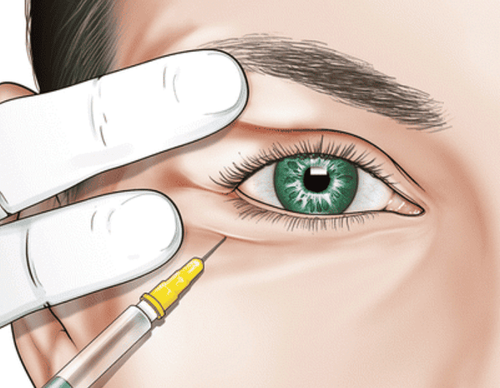This is an automatically translated article.
Retinal cancer, also known as a malignant eye disease, is a dangerous disease that not only destroys the visual function of the affected eye but can also threaten the patient's life. Therefore, it is necessary to understand the causes and manifestations of retinal cancer to detect and promptly treat.1. Causes of retinal cancer
Retinoblastoma usually occurs in young children, 90% of cases are diagnosed under the age of 4 years. This is the most common eye cancer in children. Adults rarely get sick.The cause of retinal cancer is an abnormality on chromosome 13, in which 60% of cases only show disease in the eyes and 40% have systemic manifestations.
Chromosome 13 is responsible for controlling the division of retinal cells, which are responsible for the vision of the eye. In children with the disease, the uncontrolled division of retinal cells causes retinal cancer.
In addition, there are two main factors that can increase the risk of retinal cancer:
Age: children diagnosed with retinal cancer are younger than 3 years old. Both congenital or hereditary retinoblastoma are detected in the first year of life, while non-hereditary retinoblastoma is detected between 1 and 2 years of age. Retinoblastoma rarely occurs in older children and adults. Heredity: Young children are at risk if a parent or close family member has had the disease.

Ung thư võng mạc là bệnh ung thư mắt phổ biến nhất ở trẻ em
2. Manifestations of retinal cancer
Symptoms of retinal cancer are very diverse, mainly patients have the following signs:White pupil light, this sign can be easily seen when taking pictures of children instead of red eyes when taking pictures. blind cat eyes. However, not all children with white pupil signs have retinal cancer, so when children have signs of white pupil, they should also see an ophthalmologist for a definitive diagnosis. The common and easy to recognize sign of retinal cancer is strabismus, the child's eyes do not look straight, but can squint inward or outward. In addition, children with this disease may have painful eyes, red eyes, poor vision, protrusion, iris heterochromia (different colors of the irises), dilated eyes.... Retinal cancer. is classified into 4 stages:
Stage I: Early stage, small tumor, localized to the retina. Stage II: Complicated stage, large intraocular tumor causing glaucoma. Stage III: In the foreign stage, cancer cells break through the eyeball wall, enter the orbit, and spread to the optic nerve. Stage IV: Distant metastasis, the cancer cells have spread to the lymph nodes in front of the ear, under the jaw, into the orbital bone wall, or to other parts of the body and can be fatal.

Dấu hiệu thường gặp và dễ nhận biết ung thư võng mạc là lác mắt
3. Treatment of retinal cancer
Today, there are many methods to treat retinal cancer. However, the treatment of retinal cancer depends on the time it is detected early or late, the age, the disease manifests in one or both eyes, has metastasized to other parts of the body or not. The usual treatment is:Ocular excision: this is the most common treatment and the only way to completely remove the tumor from the eye. Accompanied by ophthalmic resection is the maximal nerve excision as a pathological specimen. If the tumor is small, it can be treated conservatively by one of the following methods:
Freezing: indicated for small and anterior tumors. Xenon arc or laser photocoagulation: indicated for small and posterior tumors. Radiation: from afar (indicated for large and posterior tumors) or using radioisotope fixed on the sclera at the tumor site (indicated for medium-sized tumors). Chemotherapy: used for cases that have metastasized or are at high risk of systemic metastases. Retinal cancer is a life-threatening disease, but with proper treatment, it rarely causes death. Therefore, under the supervision of pediatric ophthalmologists and oncologists will promptly detect signs of retinal cancer to help patients increase the chances of recovery.
Periodic health check-ups help detect diseases early, thereby planning treatment for optimal results. Currently, Vinmec International General Hospital has general health checkup packages suitable for each age, gender and individual needs of customers with a reasonable price policy, including:
Health checkup package diamond general health checkup package Vip general health checkup special health checkup package Comprehensive general health checkup package standard general health checkup The patient's examination results will be returned to your home. After receiving the results of the general health examination, if you detect diseases that require intensive examination and treatment, you can use services from other specialties right at the Hospital with quality treatment and services. outstanding customer service.
To register for examination and treatment at Vinmec International General Hospital, you can contact the nationwide Vinmec Health System Hotline, or register online HERE.









